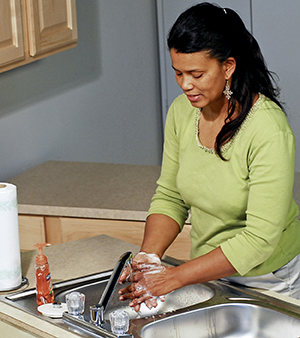A
B
C
D
E
F
G
H
I
J
K
L
M
N
O
P
Q
R
S
T
U
V
W
X
Y
Z
Click a letter to see a list of conditions beginning with that letter.
Click 'Topic Index' to return to the index for the current topic.
Click 'Library Index' to return to the listing of all topics.
Hepatitis A (HAV) Infection
Hepatitis is the inflammation of the liver. It can be caused by several things including:
-
Infections
-
Illegal drugs
-
Toxins
-
Autoimmune conditions
One of the causes is infection with a virus called the hepatitis A virus (HAV). This virus most often spreads through infected food or water that has been contaminated by infected poop. It can also spread from person to person. This can happen if someone doesn't wash their hands after being in contact with infected poop. For instance, after using the bathroom or changing a dirty diaper.
It can also be passed on by having sex with an infected person or sharing needles (such as in people who inject illegal drugs). HAV spreads more easily in group settings, such as daycare centers or nursing homes.
Unlike hepatitis B and C, HAV generally runs its course and doesn't become a long-term (chronic) illness. It may last a few weeks to 6 months. In most cases it doesn't cause long-term problems. But in rare cases it leads to acute liver failure, the need for a liver transplant, or death. HAV can be prevented by a vaccine.
Symptoms of hepatitis A infection
Symptoms often appear about 2 to 6 weeks after exposure to the virus. Possible symptoms include:
-
Fever
-
Tiredness and weakness
-
Pain in the belly, especially the right upper part (over the liver)
-
Loss of appetite
-
Upset stomach (nausea), vomiting, or diarrhea
-
Yellowing of the skin and whites of the eyes (jaundice)
-
Itchy skin
-
Dark pee and light-colored poop
Diagnosing hepatitis A
A sample of blood is taken to test for HAV. Other tests may be done to check the health of your liver.
Treating hepatitis A
-
There is no specific treatment for hepatitis A. The virus will run its course.
-
Treat symptoms as you would treat flu symptoms. Drink fluids and get plenty of rest.
-
During recovery, avoid fatty foods.
-
Don't drink alcohol, which can damage the liver.
-
Don't take any over-the-counter medicines without checking with your provider. The liver processes many medicines. Certain medicines can be harmful to the infected liver.
-
If you know you've been exposed to hepatitis A , tell your provider right away. To reduce your risk of HAV after exposure, it's advised that you have a dose of the vaccine within 2 weeks of exposure. Depending on your age and health, your provider may advise a shot of immune globulin (IG) in addition to the hepatitis A vaccine.
Preventing hepatitis A from spreading
 |
| Washing hands thoroughly and often is one of the best ways to prevent the spread of HAV. |
A person with hepatitis A can spread the virus to others, even before symptoms appear. They can keep spreading the virus for a few days after symptoms start. Take these steps to prevent HAV from spreading:
-
Wash your hands often. Always wash hands after using the bathroom or changing diapers, and before making food or eating. Work up a good lather with soap and clean, running water. Scrub for at least 10 to 15 seconds, then rinse.
-
Don't go to work or to public places until symptoms are gone.
-
Think about being vaccinated against hepatitis B. This is a more serious form of hepatitis. (Once you’ve had hepatitis A, you can’t get it again. So you don’t need the hepatitis A vaccine.)
-
The hepatitis A vaccine is advised for all children born in the U.S., starting at 1 year old. It's an inactive form of the virus. This means you can't get hepatitis A from the vaccine. The vaccine is given in 2 shots that are 6 months apart. For adults, it's given in 2- or 3-dose shots, depending on the type of vaccine.
-
People living with you should be vaccinated against hepatitis A and B if they haven’t been already.
When to call your healthcare provider
Call your healthcare provider right away if you have any of the following:
-
Symptoms get worse instead of better
-
Signs of fluid loss (dehydration). These include not peeing as often, very dark pee, dry or sticky mouth, and confusion.
-
Swelling in your hands, arms, feet, ankles, belly, or face
-
Bleeding from your nose, mouth, or rectum
-
Bloody poop
-
A yellowish color to the eyes or skin (jaundice)
Online Medical Reviewer:
Rita Sather RN
Online Medical Reviewer:
Sabrina Felson MD
Online Medical Reviewer:
Shaziya Allarakha MD
Date Last Reviewed:
3/1/2024
© 2000-2024 The StayWell Company, LLC. All rights reserved. This information is not intended as a substitute for professional medical care. Always follow your healthcare professional's instructions.